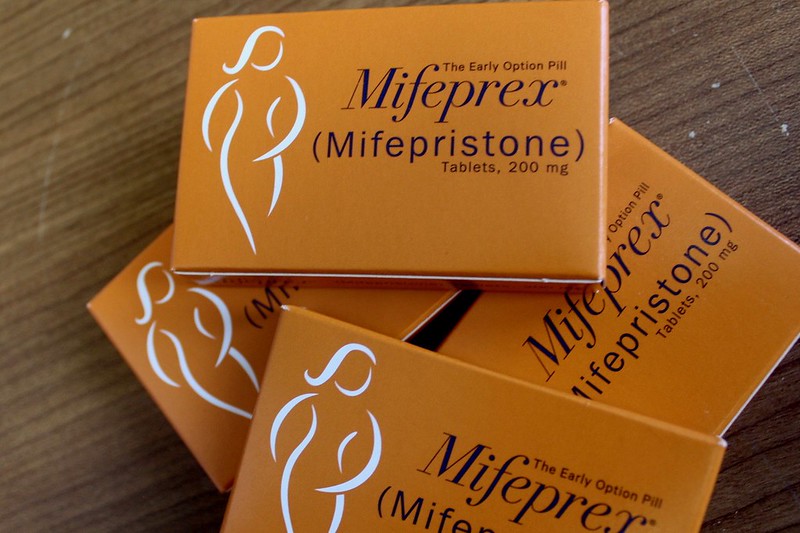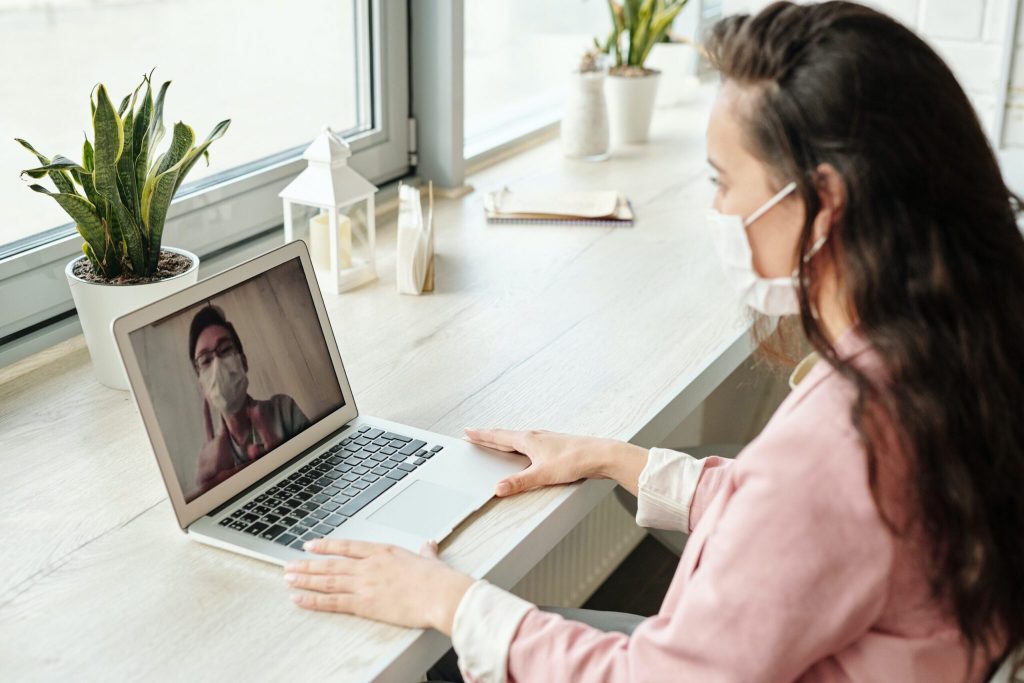“We must now fight to make this change permanent, and to lift all medically unnecessary restrictions on medication abortion during the pandemic and beyond.”
—Cynthia A. Pearson, National Women’s Health Network executive director

Last Monday, the U.S. Food and Drug Administration (FDA) issued long-awaited guidance lifting a restriction on the abortion pill mifepristone for the duration of the COVID-19 public health emergency. The move permits telemedicine abortion, a combination of medication abortion—using pills to end a pregnancy—and telemedicine, which allows health providers to supervise the use of abortion pills via videoconferencing or telephone consultations.
Dr. Janet Woodcock, the acting FDA commissioner, wrote in a letter to the American College of Obstetricians and Gynecologists (ACOG) and the Society for Maternal-Fetal Medicine that the FDA will waive a requirement that clinicians dispense the abortion pill mifepristone to their patients in a clinic or hospital setting. The letter said research studies on telemedicine abortion “do not appear to show increases in serious safety concerns occurring with medical abortion as a result of modifying the in-person dispensing requirement during the COVID-19 pandemic.”
“Today’s FDA announcement is a step in the right direction and means that patients won’t have to risk their health during the pandemic to get abortion care,” says Dr. Daniel Grossman, director of Advancing New Standards in Reproductive Health at the University of California San Francisco. “We know from 20 years of research that medication abortion is extremely safe—even safer than some over-the-counter medications. It’s past time to permanently lift the restrictions and make medication abortion more accessible for those who need it.”
ACOG health policy fellow Jen Villavicencio agreed. Mifepristone “has very few risks at all,” said Villavicencio. “It is more safe than over-the-counter medications like ibuprofen and Tylenol. We know this medication can be safely administered via telemedicine because we’ve studied it.”
The announcement came in response to a long-running campaign by activists and medical professionals to get the FDA to lift the in-person distribution requirement on mifepristone. Last month, 55 reproductive health, rights and justice groups sent a letter to President Biden urging his administration to lift the restriction. Supporters submitted petitions with over 200,000 signatures.
Advocates celebrated the FDA decision for increasing equitable access to safe abortion health care. “This safe, effective option helps close the gaps in abortion access that mostly harm people of color working to make ends meet—and are rooted in systemic racism,” says Destiny Lopez, co-president, All* Above All. “We hope this is a first step toward permanently ending these unnecessary restrictions so that people can get abortion care in the way that makes sense for them.”

Restrictions Based on Politics, Not Science
Approved by FDA for use during the first ten weeks of gestation, medication abortion uses two types of pills: mifepristone, which interrupts the flow of the hormone progesterone that sustains the pregnancy, and misoprostol, which causes contractions to expel the contents of the uterus. This combination of pills is more than 95 percent effective and is a safe way to end an early pregnancy. According to the Guttmacher Institute, medication abortion now accounts for over 60 percent of abortions in the first 10 weeks.
Despite its safety, the FDA has imposed politically-motivated anti-abortion restrictions on the distribution of mifepristone by prohibiting retail pharmacies from stocking and distributing mifepristone and requiring that the medication be dispensed only in certain health care facilities through a certified prescriber. Most health care providers interpret the word “dispensed” to require patients to make an in-person visit to their clinicians to obtain the pill, which they then ingest at home. (The advocacy group Plan C disputes this interpretation, noting that the language of the FDA restriction does not specify “in-person” dispensing or prohibit clinicians from mailing pills to patients.)
Before the pandemic, doctors usually required an ultrasound and blood test before administering the abortion pill, so clinicians would dispense the pill when patients were in the office for these tests. But recent research calls into question the need for these tests. On March 30, 2020, ACOG issued guidance stating that an ultrasound and blood testing are often not necessary because patients can reliably tell their doctors when their last period began and their blood type. As a result, health care providers are increasingly adopting a new “no-test” medication abortion protocol that eliminates the need for in-person visits and tests in most cases.
After the pandemic hit last year, ACOG and several other groups sued the FDA to allow providers to use telemedicine and mail the abortion pill to their patients during the pandemic to minimize exposure to COVID-19. Last July, a federal district court in Maryland suspended the FDA rule during the pandemic, leading to telemedicine startups across the country offering the abortion pill by mail. But in January, the U.S. Supreme Court reinstated the rule, so many of these services stopped.
When the Biden-Harris administration took office in January, abortion rights supporters hoped that the policy would change. Three months later, it finally has.
In response, ACOG issued a statement praising the new guidelines: “We are pleased to see mifepristone regulated on the basis of the scientific evidence during the pandemic, rather than political bias against comprehensive reproductive health care, and we look forward to working with policy makers to ensure this principle governs post-pandemic care.”
Telemedicine Abortion Services Resume

Shortly after the FDA issued the new guidelines, telemedicine abortion services resumed across the country. Some of the providers are Just the Pill operating in Minnesota, Choix in California, Hey Jane in New York and Washington, and carafem operating in Georgia, Illinois, Maryland, New Jersey, Virginia and D.C. The organization Plan C has a detailed guide to the availability of telemedicine abortion in each state. Telemedicine abortion is much less expensive than in-clinic care—as low as $105—and is supported by the abortion fund ReproCare Healthline.
Online pharmacies are also now resuming distribution of mifepristone by mail. “We applaud the FDA’s decision to reverse the abortion pill restrictions during COVID-19, but see this as just the first step,” said Dr. Jessica Nouhavandi, lead pharmacist, co-CEO, and co-founder of Honeybee Health, the first U.S.-based online pharmacy to ship abortion pills. “Long before the pandemic, there was a dire need to reevaluate the archaic restrictions around the abortion pill—which reflected not the science, but the politics of the medication. We hope the FDA reviews the restrictions separate from COVID-19 and helps permanently usher forth a time of greater accessibility and affordability to those in need.”
Fighting Ongoing Barriers to Care

Advocates are continuing to call on the FDA to permanently drop the restriction on mifepristone.
“We must now fight to make this change permanent, and to lift all medically unnecessary restrictions on medication abortion during the pandemic and beyond,” said Cynthia A. Pearson, National Women’s Health Network executive director. The Network coordinates a campaign, including a petition, to “get the pill where you take the pill, at home!”
But FDA restrictions are not the only barrier to telemedicine abortion access. Many states also have laws prohibiting telemedicine abortion or requiring ultrasounds that have the same effect.
“This is great that the FDA used science to reduce this barrier, but it’s clearly not enough,” Plan C co-director Elisa Wells told Ms. “We clearly still have major inequities of access in the United States. We still have at least 18 states that outright ban telemedicine abortion or have other types of restrictions like ultrasounds that make it impossible, despite the science showing that telemedicine abortion is as safe and effective as clinic-based care. So we have a huge equity issue in our country for access to abortion because of the state-based laws.”
A new ban on telemedicine abortions in Ohio that was set to take effect on Monday was blocked by a state court, while others are still advancing in Indiana, Arkansas, Iowa, Alabama, Texas, Oklahoma, Wyoming and West Virginia.
“We know that the people who are the hardest hit by abortion restrictions are people who are already marginalized either by their skin color or their socio-economic status or, in some cases, their gender identity,” says Wells. “In the states that have these intense restrictions on abortion access, that means that it’s that much harder to find access to care. This [telemedicine] model of care greatly reduces the cost and it greatly reduces the other barriers that people face in terms of having to get transportation, having to get childcare, having to take time off from work. This new model of care helps to address some of those equity issues.”
Wells hopes that increasing access will create change across the country.
“With the FDA ruling and with the types of services that are going to pop up, it’s really going to raise awareness in this country that we have this option of abortion pills, which a lot of people don’t even know about, and of the fact that you can get them in this very simple, very private, and very safe and effective way,” Wells told Ms.
“Once that genie is out of the bottle, it’s not going back in. It’s going to be available in more liberal states. As it becomes more normalized and more mainstream, then people who live in the more restrictive states will have more ammunition to demand access to it in their states as well. That’s always been our strategy to start with the low hanging fruit—the liberal states—and demonstrate the model, and then generate demand for it in the states that are more restrictive.”
Up next:





